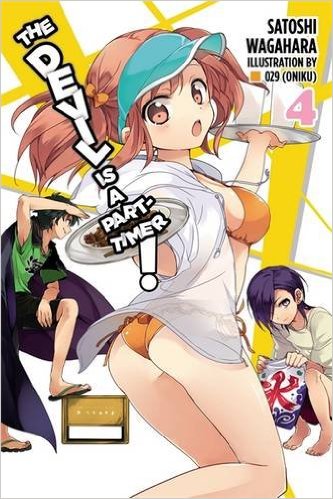By Satoshi Wagahara and 029. Released in Japan by ASCII Mediaworks. Released in North America by Yen Press. Translated by Kevin Gifford.
The Devil Is a Part-Timer! is one of the few light-novel series currently being released in North America that has not had a multi-volume arc of some kind. By the end of each volume, things are somehow resolved enough that everyone can go back to the apartment complex. And yet each successive volume builds on the last, layering on more backstory revelations, character dilemmas, and (for this particular series) religious imagery until we realize that really, it’s been one big arc all along. Which is just what you want for a series like this. Each new volume makes you want to read the next one immediately. This one in particular, as Maou finally starts to give some answers as to what he was doing back in Enta Isla. Not many, but a few.
Of course, part of the reason that Maou is able to reveal to readers that yes, he was actually trying to conquer the world through war (something he regrets now) is because we now know that he did not in fact horribly murder Emi’s father. She’s still trying to deal with everything she found out in the last book, particularly the identity and status of her mother, and it’s left her a mixture of angry and devastated. Most of these books have been Emi discovering that literally everything she lived her entire life for has been a giant lie, and that a lot of people see her as a giant tool to point and shoot. We’re still nowhere near them being friends, but Emi is finally starting to get to the point where she’s not screaming at Maou every time she sees him, and can work with him against a common enemy, which is happening more and more frequently these days.
And then there’s Chiho’s development, as it turns out that when you fill a girl with divine mystical energies and use her body as a conduit, it can actually have lasting effects. Luckily, this is a still a relatively light-hearted series, and Chiho is so big-hearted, that it mostly means teaching her ways to psychically communicate with the others in case she’s ever kidnapped again – which turns out to be of great use when she is, in fact, kidnapped again. I like the fact that Chiho turns out to be surprisingly adept at magic, to the point where even Suzuno is startled at how fast she’s picking things up, and what she’s doing with it. I also really liked that psychic thought projection is likened to cell phone usage to make things easier to understand, and that imagery may be one reason she’s so good at it.
I’d mentioned in my last review that I loved the pointless daily life segments more than anything else, and while there aren’t as many of them this time, we do get some lovely discussion of how to be a barista. The McRonald’s has now become a McCafe, which means Maou and Chiho will now be serving coffee. This also serves to give us some much-longed for depth in regards to their manager Mayumi, and her discussion of her life’s dream (to be a bartender) leads neatly to Maou discussing his own goals and dreams. Much to his frustration, everyone seems to assume that he’s hiding out in Japan to give up. No, he’s hiding out in Japan to learn how to take over the world… ECONOMICALLY! Because that’s a much less blood-filled way of conquering than the old one. It was nice seeing Maou’s drive to rule the world pop up again, and I suspect the cast will be back in Enta Isla before long – though I assume not permanently.
This series continues to be top-tier. Great plot, the backstory hangs together, the characterization flows smoothly, and the narration can sometimes be quite witty even though it’s third person. I would say I can’t wait till the next volume, but Vol. 7 appears to be a short-story collection, so I’ll likely have to wait till Vol. 8. That’s OK. Like Maou, I’m patient.





